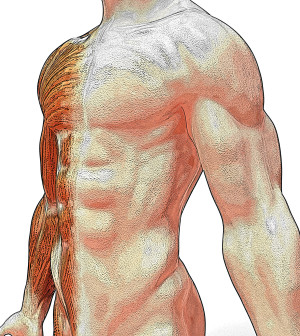- The Best Time of Day to Drink Bone Broth to Maximize Health Benefits
- 8 Ways to Increase Dopamine Naturally
- 7 Best Breads for Maintaining Stable Blood Sugar
- Gelatin vs. Collagen: Which is Best for Skin, Nails, and Joints?
- The Long-Term Effects of Daily Turmeric Supplements on Liver Health
- Could Your Grocery Store Meat Be Causing Recurring UTIs?
- Are You Making This Expensive Thermostat Error This Winter?
- Recognizing the Signs of Hypothyroidism
- 10 Strategies to Overcome Insomnia
- Could Artificial Sweeteners Be Aging the Brain Faster?
Depression May Be Linked to Heart Failure


Depression may increase the risk of heart failure, a new study suggests.
Researchers looked at nearly 63,000 people in Norway who underwent physical and mental health assessments.
Over 11 years, close to 1,500 of the participants developed heart failure. Compared to people with no symptoms of depression, those with mild symptoms were 5 percent more likely to develop heart failure, and those with moderate to severe symptoms had a 40 percent increased risk.
The study was scheduled for presentation Friday at a meeting of the European Society of Cardiology in Stavanger, Norway.
“Depressive symptoms increase the chance of developing heart failure and the more severe the symptoms are, the greater the risk,” study first author Lise Tuset Gustad, an intensive care nurse at Levanger Hospital in Norway, said in a society news release.
“Depressed people have less healthy lifestyles, so our analysis adjusted for factors such as obesity and smoking that could cause both depression and heart failure,” she added. “This means we can be confident that these factors did not cause the association.”
In people with heart failure, the heart can’t pump enough blood through the body.
The study doesn’t prove depression causes the condition, only that the two are often linked.
“Depression triggers stress hormones. If you’re stressed you feel your pulse going up and your breath speeding up, which is the result of hormones being released. Those stress hormones also induce inflammation and [plaque buildup in arteries], which may accelerate heart diseases,” Gustad explained.
Also, depressed people find it more difficult to follow advice about how to take medications and improve their lifestyle, added Gustad, noting this might also explain the association.
She said that there are effective treatments for depression, particularly if it’s diagnosed early.
“The early symptoms of depression include a loss of interest and loss of pleasure in things that have normally been interesting or given pleasure,” Gustad said. “If you feel like that, speak to your friends, and if it lasts for a month see your doctor or nurse.”
Depression can be treated easily in the early stages and many people don’t need medication, she added. “Talking to a professional may be all you need,” Gustad said.
Research presented at meetings is typically considered preliminary until published in a peer-reviewed medical journal.
More information
The U.S. National Institute of Mental Health has more about depression.
Source: HealthDay
Copyright © 2026 HealthDay. All rights reserved.










